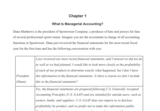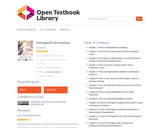
Kurt Heisinger and Joe Ben Hoyle believe that students want to learn accounting in the most efficient way possible, balancing coursework with personal schedules. They tend to focus on their studies in short intense segments between jobs, classes, and family commitments. Meanwhile, the accounting industry has endured dramatic shifts since the collapse of Enron and WorldCom, causing a renewed focus on ethical behavior in accounting. This dynamic author team designed Managerial Accounting to work within the confines of today’s students’ lives while delivering a modern look at managerial accounting.
Managerial Accounting was written around three major themes: Ready, Reinforcement and Relevance. This book is aimed squarely at the new learning styles evident with today’s students and addresses accounting industry changes as well.
Table of Contents
Chapter 1: What Is Managerial Accounting?
Chapter 2: How Is Job Costing Used to Track Production Costs?
Chapter 3: How Does an Organization Use Activity-Based Costing to Allocate Overhead Costs?
Chapter 4: How Is Process Costing Used to Track Production Costs?
Chapter 5: How Do Organizations Identify Cost Behavior Patterns?
Chapter 6: How Is Cost-Volume-Profit Analysis Used for Decision Making?
Chapter 7: How Are Relevant Revenues and Costs Used to Make Decisions?
Chapter 8: How Is Capital Budgeting Used to Make Decisions?
Chapter 9: How Are Operating Budgets Created?
Chapter 10: How Do Managers Evaluate Performance Using Cost Variance Analysis?
Chapter 11: How Do Managers Evaluate Performance in Decentralized Organizations?
Chapter 12: How Is the Statement of Cash Flows Prepared and Used?
Chapter 13: How Do Managers Use Financial and Nonfinancial Performance Measures?
- Subject:
- Accounting
- Business and Communication
- Management
- Material Type:
- Textbook
- Provider:
- The Saylor Foundation
- Provider Set:
- Saylor Textbooks
- Author:
- Joe Hoyle
- Kurt Heisinger
- Date Added:
- 04/24/2019

